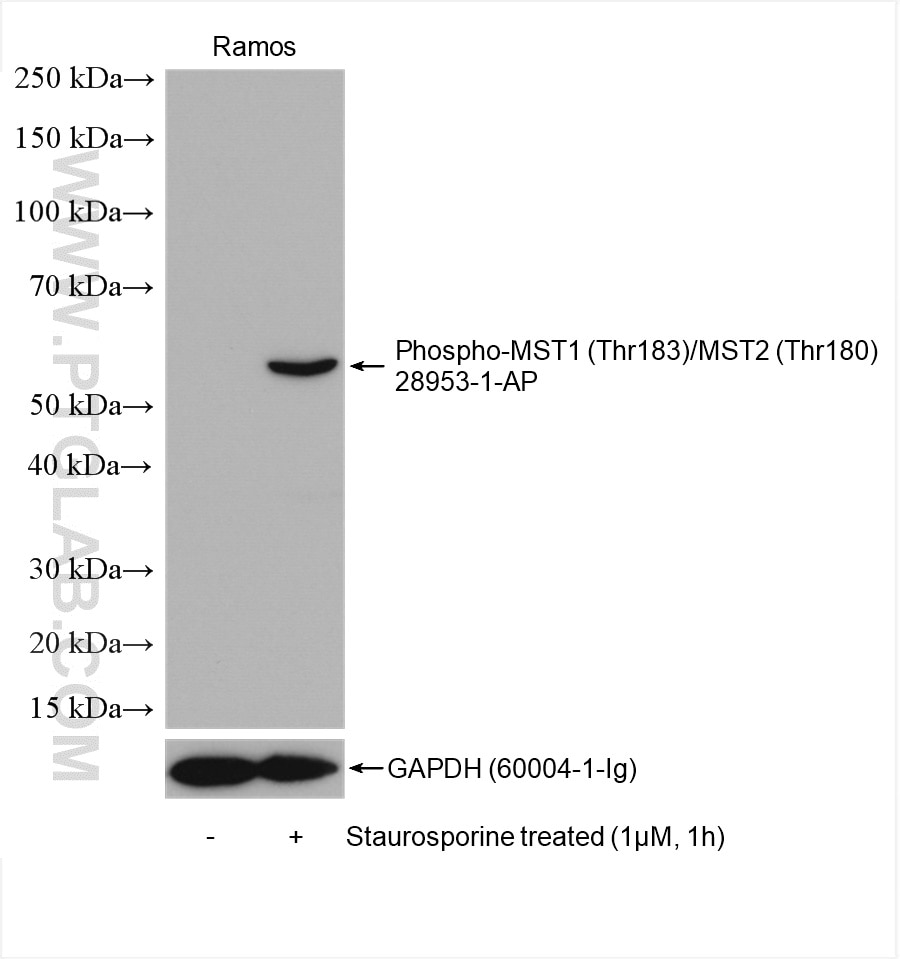Anticorps Polyclonal de lapin anti-Phospho-MST1 (Thr183)/MST2 (Thr180)
Phospho-MST1 (Thr183)/MST2 (Thr180) Polyclonal Antibody for WB, ELISA
Hôte / Isotype
Lapin / IgG
Réactivité testée
Humain
Applications
WB, ELISA
Conjugaison
Non conjugué
N° de cat : 28953-1-AP
Synonymes
Galerie de données de validation
Applications testées
| Résultats positifs en WB | cellules Ramos traitées à la staurosporine, |
Dilution recommandée
| Application | Dilution |
|---|---|
| Western Blot (WB) | WB : 1:500-1:2000 |
| It is recommended that this reagent should be titrated in each testing system to obtain optimal results. | |
| Sample-dependent, check data in validation data gallery | |
Applications publiées
| WB | See 3 publications below |
Informations sur le produit
28953-1-AP cible Phospho-MST1 (Thr183)/MST2 (Thr180) dans les applications de WB, ELISA et montre une réactivité avec des échantillons Humain
| Réactivité | Humain |
| Réactivité citée | Humain |
| Hôte / Isotype | Lapin / IgG |
| Clonalité | Polyclonal |
| Type | Anticorps |
| Immunogène | Peptide |
| Nom complet | serine/threonine kinase 4 |
| Masse moléculaire calculée | 56 kDa |
| Poids moléculaire observé | 52-56 kDa |
| Numéro d’acquisition GenBank | BC005231 |
| Symbole du gène | STK4 |
| Identification du gène (NCBI) | 6789 |
| Conjugaison | Non conjugué |
| Forme | Liquide |
| Méthode de purification | Purification par affinité contre l'antigène |
| Tampon de stockage | PBS avec azoture de sodium à 0,02 % et glycérol à 50 % pH 7,3 |
| Conditions de stockage | Stocker à -20°C. Stable pendant un an après l'expédition. L'aliquotage n'est pas nécessaire pour le stockage à -20oC Les 20ul contiennent 0,1% de BSA. |
Informations générales
Mammalian STE20-like serine-threonine kinase MST1, encoded by the STK4 gene, is a multifunctional protein. MST1 and its closest paralogs MST2 (encoded by the STK3 gene), MST3, and MST4 are members of the Class II Germinal Center Family of Protein Kinases. MST1/2 and LATS1/2 (large tumor suppressor 1 and 2) are core kinase components of the Hippo tumor suppressor pathway in mammalians . In the conventional Hippo pathway, the MST1/2 and LATS1/2 signaling cascade phosphorylates and inactivates the transcriptional coactivator YAP1 (yes associated protein 1) and its close paralog WWTR1]. YAP1 and WWTR1 do not have DNA binding domains and they exert their biological outputs, such as cell proliferation and survival, by interacting with the TEAD1-4 transcription factors. Lines of evidence have indicated that dysregulation or loss of STK4/Hippo signaling is linked to developmental disorders and carcinogenesis with poor prognosis. MST1 is a stress-induced kinase and it can be activated in response to cell-death inducers. Autophosphorylation of MST1 at Thr183 (Thr180 in MST2) in the activation loop is a key activation mechanism for MST1/2 because phosphorylation of Thr183/180 causes the cleavage of MST1 by caspases under apoptotic conditions.
Protocole
| Product Specific Protocols | |
|---|---|
| WB protocol for Phospho-MST1 (Thr183)/MST2 (Thr180) antibody 28953-1-AP | Download protocol |
| Standard Protocols | |
|---|---|
| Click here to view our Standard Protocols |
Publications
| Species | Application | Title |
|---|---|---|
Int J Biol Sci S100 Calcium Binding Protein A16 Promotes Cell Proliferation by triggering LATS1 ubiquitin degradation mediated by CUL4A ligase to inhibit Hippo pathway in Glioma development | ||
Cell Death Dis PLAGL2 promotes bladder cancer progression via RACGAP1/RhoA GTPase/YAP1 signaling | ||
Discov Oncol Upregulated GPRC5A disrupting the Hippo pathway promotes the proliferation and migration of pancreatic cancer cells via the cAMP-CREB axis |


